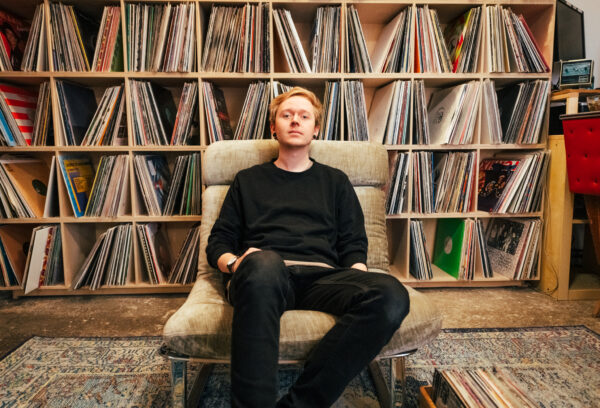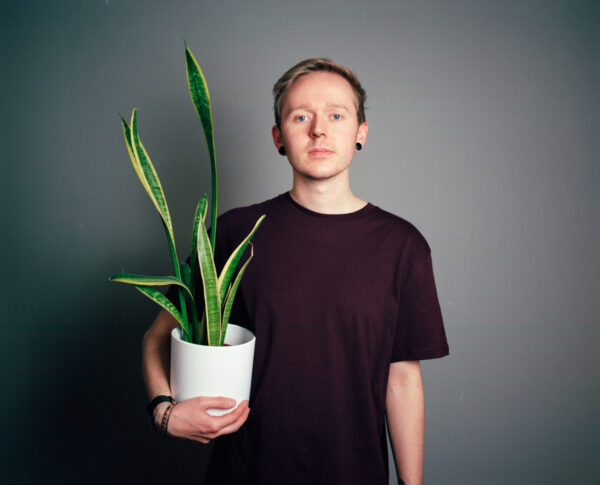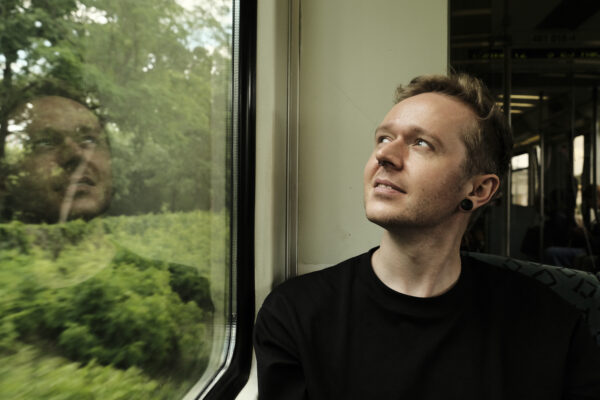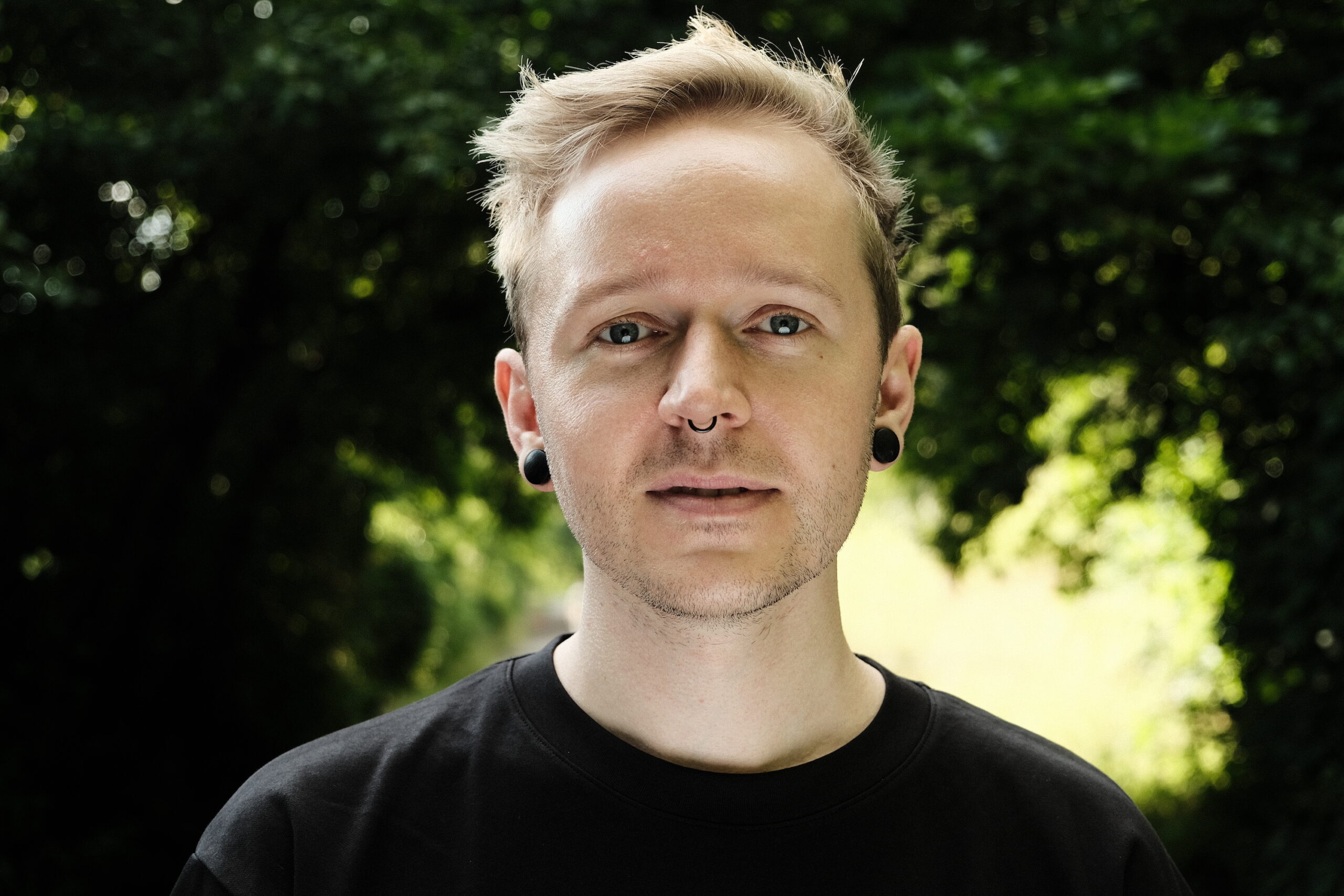Alexander Skancke talks about wearing his heart on his sleeve on his latest record and how he got here today ahead of his next Sunkissed appearance
In a recent video from his Instagram account, Alexander Skancke can be seen playing on a rooftop in Kiyv Ukraine. Below the video, there’s a personal message of thanks and appreciation for the resilience of the scene and people in the country. The DJ, label boss and record peddler has always worn his heart on his sleeve, and the post reflects the personal approach he adopts through everything he does, including his records.
Last year, his debut LP, Kingdom Couch delivered a self-reflective account that confronted mental health and therapy head-on in the wake of isolation during the pandemic. His minimal production touches bleep with insecurities while menacing sonic textures carve desolate landscapes throughout. It’s unusual to find electronic music artists getting that literal with their music and rarer still for them to get as raw as Alexander gets in his vocal delivery.
“I am an open book,” he reflects via a telephone call from Berlin.
Originally from Trondheim, Alexander has called Berlin home for some time, and has established a career and label from the German city. His label Quirk has become a significant feature in record stores everywhere and when he’s not working on the label or DJing, he spends his time at Bikini Waxx, a record store and distribution company, nestled in a courtyard in Kreuzberg.
He is a familiar name on lineups across the rest of the city, and his label nights are a regular feature on Club Der Visonaire’s a calendar. He’s been playing on the international circuit since releasing his first records and even on occasion makes a stop at Oslo for the likes of Det Gode Selskab.
With another upcoming gig for Sunkissed at Jaeger, his first visit to the club in a long time, we took the opportunity to catch up with the DJ, artist and label runner. We talk about his start, what it takes to be a DJ and more, but we begin with his latest record.

The latest release, I love you, is another example of you getting personal in your music. There’s a sweet story behind the origins of the record. Can you tell us about it?
I am really fortunate to have fallen in love with a really nice girl. It came out of nowhere and I used that as inspiration to finally write a record about love. Every artist has to do that at some point; write a record about love. It might be a cliche, but I wanted to do it as cliche as possible.
It is unusual in the electronic dance music environment to hear artists getting so personal and wearing their heart on their sleeve like this.
Yeah, I’m an open book. I also wrote my last album going through a really hard time. The album was about going to therapy and struggling with isolation, like we all did during covid. Now, at the end of that, theres falling in love and building a life with what could be my life partner.
When you are dealing with something as abstract as electronic music, how do you relay that sentiment to the listener?
It’s more of a feeling in a track, whether it’s happy, sad, mysterious or more abstract. I also use a lot of my own vocals and they are pretty direct.
There is definitely an uplifting feeling to this record, and it’s in part to that kind of nineties-era House sound that you have going through this record. Is that something you were trying to bring across on this record?
I will definitely credit all the American artists that paved the way for house and techno music in the eighties and early nineties. They have been a huge inspiration to me. I guess it’s kind of an ode to that era.
I read that you have been collecting records since you were 14. Is that correct?
Yes, I used my confirmation money at 14. I was at a crossroads of whether I should buy a mountain bike or a pair of turntables. My dad recommended I buy the turntables, and I only found out afterwards that my mom had said; ‘yeah give him two months and it will be over’, but they are all very proud and happy for me now. I still have those turntables. It spiralled out of control after that.
What planted the seed for you to want to become a DJ and was there anything like a community in Trondheim that urged you along?
I was in the basement, with nothing but two turntables and a mixer and I had to teach myself.
What really inspired me was that there were musicians on both sides of the family. My grandfather was a multi-instrumentalist and he would tour the world playing in brass-bands. He was a piano teacher and he used to teach kids how to play all kinds of instruments in school.
So I was always around music, but I think starting to DJ was more of a rebellious act, even though my father was playing stuff like leftfield, the orb, and prodigy at an early age.

So your dad was pretty open to contemporary electronic music?
Yes, he’s the one to credit for all of this, I would say.
Does your dad also play an instrument, or is he just a fan of music?
He doesn’t play any instruments, but I don’t know anyone that’s such a music collector as he is. So there was a constant exposure to all kinds of genres growing up.
What were those first records you bought?
When I bought the turntables, the guy gave me a stack of records, which was a mix of UK Hard House, Trance and 90’ Techno. I don’t remember which records they were, but they are definitely gone by now.
Was there a record store in Trondheim that you would frequent or were you already getting stuff online at that point?
There was no record store in Trondheim, so I would buy records every week from juno.co.uk. When I got a little older, I even took out a student loan to buy more records… I’m still paying for that.
I hope you still have those records.
Yes, a few of them, and I still play them.
Did you start making music around the same time as well?
I wouldn’t call it making music. It was just fooling around with some software on my computer. I started really getting into it around 2009. After that I was on it 24/7.
Did you have any formal musical training or was it like DJing, you thought yourself?
I always wanted to play in a marching band as a kid, but since I was skiing and playing football, there was no room to join the marching band too. My grandfather tried to teach me how to read music and then he sadly passed away suddenly. I’m more or less self-taught in everything I have done. I’m really stubborn and I have to give some credit to the Internet and the people out there in that regard.
Yes, it’s such a wealth of knowledgeable people sharing their thoughts and practices.
For production; there has always been a ton of things out there, but when it comes to DJing, you can learn the technical aspects of it, but DJing is so much more than that. You have to learn by doing and experience.
The internet can’t prepare you for playing in front of a crowd.
Exactly. You can stand in your bedroom and DJ for fifty years, but when it comes to playing in a club, this you have to do by experience. I truly believe it takes over ten years to understand the true essence of DJing.
When did you move to Berlin?
I’ve been a bit on and off with Berlin. I first moved here in 2013 for half a year and then I moved to Budapest for 2 years. I moved back to Berlin in 2016 and have been living here since.
And did you start at Bikini Waxx immediately?
Bikini Waxx started a year later. It started with an intern position, uploading records to our webshop, in exchange for some records. It quickly evolved into a full time position. My career evolved parallel to the job.
As you evolved as a DJ did you find the recordstore having an effect on your approach?
100% of course. I’ve been DJing for 19 years, and if I look back, it’s only in the last 5 years that I’ve figured out what it’s about. It takes a long time to understand it. I’ve heard this from other established DJs too.
I guess why the scene is still dominated by the established DJs that have been doing this for years and have the experience.
Exactly. There’s always a new generation coming in, but many of them, at least in my circle, are already 30+ and they’ve been doing it since they were kids.
When you did finally understand it, like you said, was there a particular catalyst for that aha moment in your career?
It’s from working in the record shop, which gave me a lot of exposure to different kinds of music, but it also made me see how people are using, buying and selecting music. I quickly realised a pattern where people are buying music that is perhaps not to their personal taste, but what they think is a trend or a hype. When I realised that, I thought to myself, nothing really matters except for what I truly feel and love. So I am personally trying to stay away from trends and hype.

Is that something that relates to your music? Listening to the Quirk catalogue and your own stuff, there’s certainly a style there doesn’t waver. Has it always been like that or was there a similar eureka moment for you?
Obviously it’s evolved from the early records to now, but what happened when I started Quirk, it gave me the freedom to really express myself instead of trying to cater for another label, based on that sound. Being independent had freed up so much pressure as an artist. That’s why I started the label. After I did that first record and it became successful, I started to produce records that I truly felt reflected me and myself as an artist.
There is this groovy, deep and minimal thing that I would suggest is you, but then there are also these touchstones whether it be Garage (Jungle Japes) or Breakbeat (Lockmind) that recontextualizes your music. Is there a process to incorporating elements like these in your music?
Firstly it’s because I work in a record shop with all kinds of genres, even outside electronic music. It truly comes from going to clubs and seeing the great masters of Djing. They can flip something going from minimal to electro or even breakbeat. Being on the dance floor and experiencing this, I have left parties to go home and make music. I’ve been inspired by the genres and the DJs, but it always has this minimalistic approach to it.
Is that minimalistic approach something that has been there since the start and something you’re just naturally drawn to?
Yes, I’ve been into that pretty much since I started in 2006 and that was the heyday of Minimal and Tech House and it’s stuck with me since. I’m waiting for the great come back. (Laughs) It’s the same story for everybody getting older wanting to get back to the “golden days”. (Laughs)
I spoke to Henriku (who you know and work with) and he was saying the minimal scene is not as prominent as the harder side of Techno. What is your experience in the current context?
It’s always there, Berlin is a huge city with enough room for all of us to have our microcosms. Minimalistic music is not the hottest or trendiest at the moment, although I don’t care too much about that to be honest. What matters is what you feel and love. Legendary artists have a cult following; so there is always room for it and it inspires a new generation. With every new generation they want to do it differently than the past. Ultimately, it’s the young people that decide what direction the music will go, because they are the ones going to the club.
As of now, the music is very fast paced. It’s full of energy and very Techno and Trance oriented. There will always be a counterculture and this goes in cycles. That is the beauty of Berlin. There is room for all of it.
Do you still go to clubs when you are not playing and where do you like to hang out in Berlin?
I still go, but perhaps a little less than when I moved to Berlin, but if I go out I go to Heideglühen or I’ll have the casual beer at Club Der Visionaere; it’s been my second home for many many years and still is.

